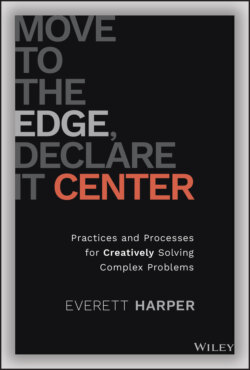Читать книгу Move to the Edge, Declare it Center - Everett Harper - Страница 20
Proposal: Adopt a New Mindset for Making Decisions
ОглавлениеConsider the following perspective: At the start of the 2020s, we have been presented with a worldwide experiment that affects everything from education to health policy. We have a global control condition – what happens when you shut down offices and confine people to homes? Academic and leadership careers will be made because these conditions reveal some basic assumptions that we could never explore in depth before. For example, most of our beliefs about work and productivity assume a building, whether it is an office, store, or factory. Many of our so‐called best practices assume face‐to‐face interaction. How many of our theories of innovation assume in‐person serendipity like the proverbial water cooler conversation? Challenging these assumptions opens up multitudes of options to observe, experiment, and rethink. But if being confronted with the evidence that our offices were not founts of creative innovation, but of status‐enforcing, energy‐sapping activity without meaningful output, leaders may not make the best decisions for themselves or their companies.
Instead, imagine a different mindset. John DeGioia, Chancellor of Georgetown University, was hired with a “simple” task – create the twenty‐first‐century university.29 Sounds exciting, except there was the constraint that this modern university must respect over 200 years of academic history and 2000 years of Jesuit / Christian history. In other words, his mandate was actually a complex problem – is there a singular answer to “What is a twenty‐first‐century university?” He believed there were changes needed that they could not predict in advance, and thus not plan for in a traditional way. Instead, he encouraged his team and department heads to collaborate, experiment, and iterate. He knew this would be a challenge for professors and department chairs, and he needed to create room for them to fail – not the usual mandate for proud academic departments.
In a speech where he described the project, Chancellor DiGioia reflected that he told his teams: “We have a result that's not what we expected, and we will have to do something different … will you follow me anyway?” We've been trained to assume systems are complicated when they are complex. We often have reflexive reactions to stress, and as a result, we can make poor decisions. In particular, the simple, but profound decision to take a public stand on a controversial issue can render the most experienced leaders silent with fear of making a mistake. However, my proposal is that we can practice methods to explore uncertainty and complexity with curiosity, create processes to enable others to follow, and train ourselves to sustain our efforts without burning out. Move to the Edge, Declare It Center doesn't protect you from making mistakes. It doesn't ensure that you will always have the best answer. What I hope you get out of this book is that intentional practice, both exterior with our teams and organizations, and interior with ourselves, will enable you to make better decisions.
